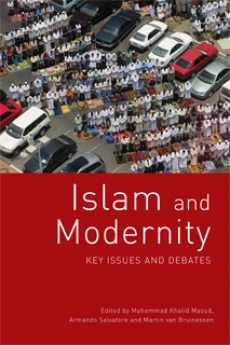| Preface
The idea of the present book emerged in 2002 when the editors began developing a postgraduate course on Islam and modernity at the International Institute for the Study of Islam in the Modern World (ISIM) in Leiden, The Netherlands. Our aim was to engage with Western social thought as well as with the ideas and visions of nineteenth- and twentieth-century thinkers in the Muslim world concerning the political, socio-economic and cultural transformation of their societies. We found that there was no single book we could use to introduce the range of subjects that we thought essential for such a course. The scholarly literature on various aspects of Islam and modernity is rich and complex and rapidly expanding, but there is a dearth of general works that offer an interdisciplinary perspective and overview of the major questions and debates in this literature. We convened a workshop at ISIM on ‘Islam and Modernity, Key Issues and Debates’ in October 2004. The present book is an outcome of continued deliberations and revisions of the papers presented at the workshop.
The book aims to provide refl ections on major debates that have taken place within and between the various scholarly disciplines that have addressed questions of modernity in connection with Islam and Muslim societies. The book is organised in three parts. The fi rst part, ‘Conceptualising Modernity’, consists of two chapters that introduce theoretical and general issues in modernity studies. The four chapters in the second part, ‘Negotiating Modernity’, offer an analysis of the processes of modernisation of Muslim societies, focusing on certain specific aspects of their social and political dynamics. The four chapters in the third part, ‘Debating Modernity’, survey how Muslim scholars and intellectuals have perceived and responded to issues of modernity. The contributors to the book are drawn from among the best-known scholars in the fi eld, whose earlier work we found most seminal and stimulating in our teaching.
The immediate background to the importance of producing such a textbook is under everybody’s eyes. Dramatic events have focused public attention on the potential tensions between the Muslim world and the modern West. Are such tensions rooted in real differences or in distorted perceptions? Compared to the other world religions, Islam appears either more resistant to internal development, with less prospect of change or, in spite of all efforts at reform, inherently pre-modern. Islam, it is frequently claimed, has experienced neither a major reformation, as has Christianity, nor been touched by Enlightenment. Or, paradoxically, as some observers would have it, Islam would no longer be Islam if truly reformed.
The new Islamist movements that emerged in the 1970s out of earlier reform trends and forms of socio-political mobilization (most notably the organization of the Muslim Brothers that saw the light in the late 1920s) appear to be primarily directed against the modernising secular elites that have dominated most Muslim societies during the fi rst decades of post-colonial independence. Some observers (for example, Bruce Lawrence) have described these movements as a ‘revolt against modernity’. Other scholars, on the other hand (notably the British philosopher John Gray, but also many others), have commented on the essential modernity of these same movements.
Muslim societies have been subjected to most of the structural changes that have also impacted upon other societies in the world – such as massive urbanisation, mass education, dramatically increased communication, the emergence of new types of institutions and associations, erratic yet at times powerful waves of political mobilisation and major transformations of the economy. These developments have been accompanied by the emergence of a wide range of new social movements, often matched by heated religious and ideological debates that were more complex and varied than is commonly assumed in Western public discourse. The academic literature on such topics is extensive and rapidly growing. One of the most contentious issues being debated concerns the idea of the uniqueness and singularity of Western modernity versus the notion of inherently multiple modernities unfolding through a variety of trajectories. Yet both the literature and the debate are still fragmented and inaccessible to a wider public. No consensus has emerged even about the terms in which the debate should be carried on; the concept of modernity remains ambiguous and risks becoming hostage to opposing paradigms.
Each of the chapters in this volume deals with some specifi c aspects of the encounter of Muslim societies with modernity. Although each of the contributors is inevitably more familiar with particular societies and regions than others, and individual chapters may have a certain regional emphasis, the volume as a whole does not privilege the Middle East or any other region but covers the entire Muslim world. The chapters are thematically organised, and we have made an effort to ensure that developments in all major regions are represented.
We wish to acknowledge ISIM’s fi nancial support for the initial workshop and part of the editing process and thank especially Sanaa Makhlouf for her editorial help. We take this opportunity to express our gratitude to all our colleagues who supported this project, especially David Waines for his invaluable cooperation at the initial stages of this project. Lastly we wish to thank the students at ISIM, whose participation in the course and discussions helped in the development of this project.
Muhammad Khalid Masud
Armando Salvatore
Martin van Bruinessen | 